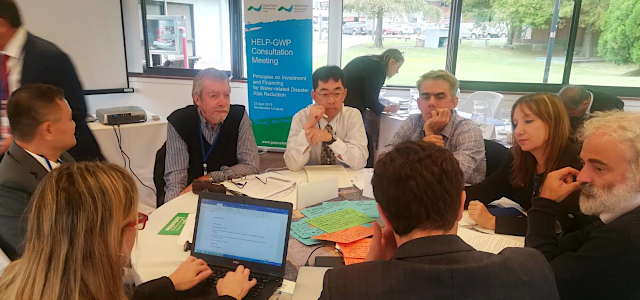The consultations were organised on the request of the High-level Experts and Leaders Panel on Water and Disasters (HELP), with funding from the Ministry of Land, Infrastructure, Transport and Tourism (MLIT) of Japan and the National Graduate Institute for Policy Studies (GRIPS), Japan. They were led by the HELP Secretariat with support by the five GWP regional secretariats and the GWP global secretariat, which provided a platform of stakeholders and facilitated the discussions.
The consultations collected comments on the contents and possible implementation of the principles in different regional context. There was a consistent call to include more explicitly in the principles:
- Non-structural measures, including interventions in capacity building and a focus on governance, management measures, and institutional development
- Green infrastructure
- The importance of focusing on the most vulnerable sections of society
- Strengthening the evidence base for the economic argument to shift from response to preparedness and risk reduction
- The principles’ call for the shift of the ratio for disaster risk reduction and for emergency response from the current 10%:90% to 90%:10% should be reconsidered
- Climate change and drought management
- Integrity and transparency in the management of funds
The Central and Eastern Europe consultation was held in Romania on 9 October 2018. The event was attended by 36 participants from 10 countries. They noted that current investments are directed to emergency response and recovery of economic damages, while the investments for disaster prevention and preparedness are still very limited. The key message was that the countermeasures implemented in advance against water related disasters are not a cost but an investment for the future.
South Asia hosted a consultationin Sri Lanka on 12 October 2018, with 29 participants from 7 countries. The participants there also agreed that it’s not possible to provide relief for all the frequent disasters, so prevention is important. Communities should emphasize risk reduction more than relief and financial aid.
Southern Africa’s consultation was held in Zambia on 31 October 2018. It was attended by 29 participants, who stressed that prevention is important for socio-economic development, and disaster risk reduction is an important element of integrated water resources management and integrated land use management. An emphasis needs to be given to develop risk reduction strategies relevant at local level and the sustainability of these interventions.
In South East Asia, 44 participants from 11 countries attended the consultation in Vietnam on 22 March. They pointed out the need to strengthen the evidence base, since investment decisions will require scientific and evidence-based information to convince and most effectively to allocate it. The identified measures need to benefit vulnerable groups and understand the local capacity to implement.
The fifth and final consultation was hosted by GWP South America in Uruguay on 23 April. 18 participants from 6 countries attended the event. They suggested a strong focus on citizen awareness in ways that is actionable for people, for example, where to build and where not to build a house. One of the comments at this event summed up a consensus from all the regional consultations, with Pablo Kaloghlian from Argentina Water Ministry saying: “I was really surprised how all the countries in the regions share almost the same vision and priorities when it comes to risk events and water management.”
The full report is available here.
Please note that the “Revised Principles on Investment and Financing for Water-related Disaster Risk Reduction” will be released by the High-level Experts and Leaders Panel on Water and Disasters (HELP) on 24 June 2019.
Photo: GWP South America hosted the fifth and final consultation on 23 April.

